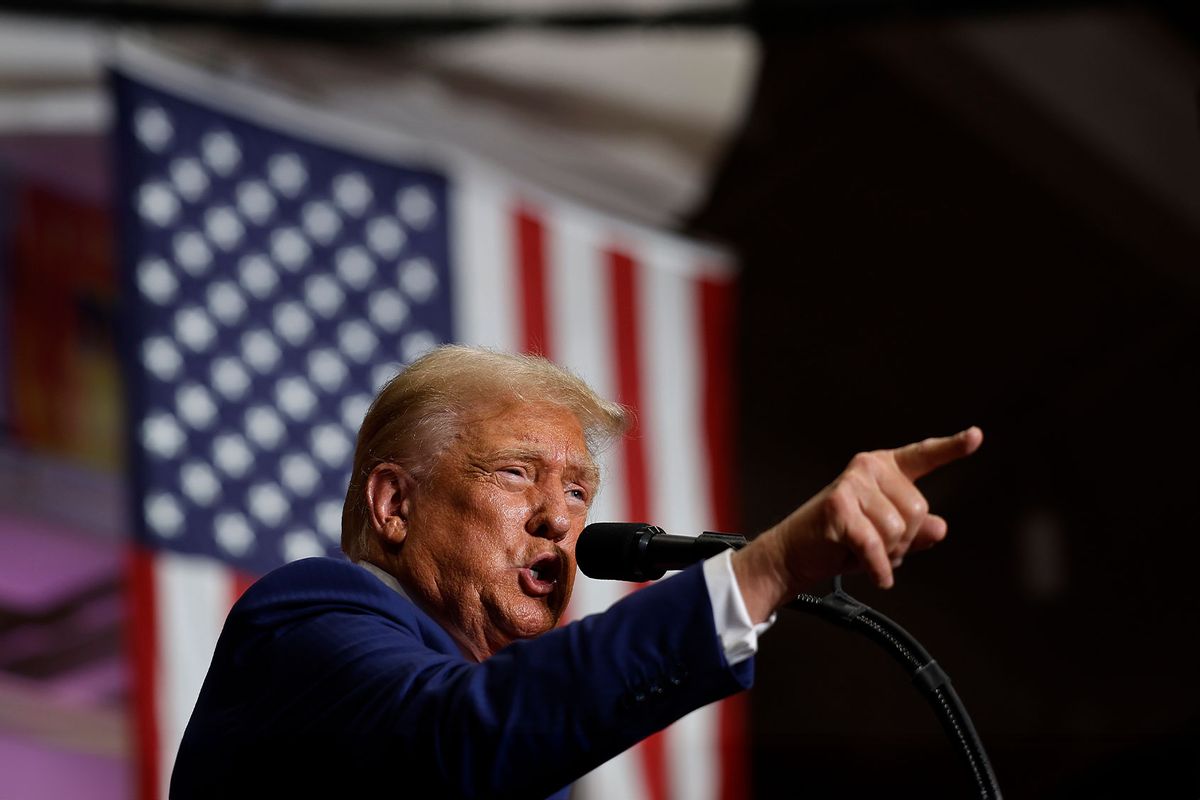A frustrating aspect of this last decade of Donald Trump is that the former president and three-time Republican candidate is not subtle, even as supporters and apologists act as if his increasingly rambling speeches contain hidden meanings that can only be fairly interpreted by select MAGA scholars. When liberal critics argue that he wants to tear up the Constitution, they can point to him straight-up calling for its “termination”; when they say he wants to be a dictator, they can point to him saying, well, he wants to be a dictator, at least on “day one.”
For those alarmed by the state of American democracy, the frustration is that it doesn’t seem matter: Trump could say anything and the usual people would say he doesn’t mean it. And when he makes clear that he does, in fact, mean it? Partisans shift to explaining why that’s good, the GOP and associated media reduced to a cult of personality, forced to defend whatever a 78-year-old man has said or done, and consequently degraded, traditional conservatism, for all its faults, replaced by an increasingly fascistic vision of power.
The question of whether Trump may pose a threat to democracy was answered on January 6, 2021, when the sitting president, refusing to accept the results of a free and fair election, encouraged the faithful to march on the U.S. Capitol and then sat back and watched, for hours, as supporters ransacked the building in search of a vice president to hang. It was the culmination of a months-long plot to overturn President Joe Biden’s 2020 victory — crimes, in the view of special counsel Jack Smith, who last month re-indicted Trump over his and his allies’ efforts to remain in power by hook or by crook (i.e., mob violence and fake electors).
Smith’s new indictment is a response to the Supreme Court’s right-wing majority ruling this summer that former presidents, meaning Donald J. Trump, enjoy presumed and absolute immunity for “official” acts, a sweeping and novel view of executive power and its restraints, or lack thereof, that finds little support in the country’s founding text. The new indictment, which again accuses the Republican nominee of criminal election subversion, seeks to reframe Trump’s actions not as those of a president but as a desperate candidate for office.
In the end, six conservative justices on the Supreme Court will likely decide whether the fresh indictment respects their new immunity doctrine. In the meantime, Trump is doing his thing: admitting that he’s guilty of what liberals say but arguing that it’s fine.
“Whoever heard you get indicted for interfering with a president election, where you have every right to do it?” Trump asked in an interview that aired Saturday on Fox News.
Trump here is bluntly stating reality as he perceives it, or perceives that it should be. If Richard Nixon believed hat “when the president does it, that means that is not illegal,” Trump likewise believes that the rightness of an action hinges on whether or not he is the one doing it.
“Trump claims he can lawfully interfere with presidential elections,” noted Andrew Weissmann, a former federal prosecutor who worked for special counsel Robert Mueller, while “simultaneously saying if others do so to aid [Kamala] Harris they will face prosecution.”
In an earlier age, it might have been easier to mock the sentiment. But when Nixon claimed total immunity, he was already disgraced and out of power; Trump, by contrast, was disgraced for no more than 48 hours after Jan. 6 before returning to his status as unquestioned leader of the Republican Party, armed with a half-dozen justices who have the same, albeit more polished, view of presidential power.
“The inalienable right to steal elections,” University of Washington political science professor Soctt Lemieux dubbed it. “Of course, this might be a little less disturbing had his allies on the nation’s top appellate court not more or less agreed with him.”
But legal experts, perhaps with a rosier view of how the Supreme Court might come down on a view of immunity stated so vulgarly, generally reject Trump’s belief that Trump can do whatever he pleases.
“There’s no right to ‘interfere’ with a presidential election,” Joyce Vance, a former U.S. attorney who teaches at the University of Alabama School of Law, wrote on social media. Trump, she said, is “asserting he can override the will of the voters to claim victory in an election he lost. And, he will do it again.”
Voters will have a chance to reject that vision in November; Trump has promised his own supporters that, should he win, they will never have to vote again. But before the election, legal experts said there is another opportunity for Trump’s own words to haunt him.
“Paging [Alvin Bragg],” Jennifer Taub, a law professor at Western New England University School of Law, wrote on social media. Bragg, the Manhattan district attorney, secured 34 felony convictions of Trump, who is scheduled to learn Sept. 18 whether or not he will have to go to prison or go on probation. Pointing to his Fox News appearance, Taub commented: “A transcript of this interview might be helpful for the sentencing memo your office is drafting.”
Trump could get up to four years behind bars from Judge Juan Merchan. On the other hand, if he wins in November, it’s his political opponents — those he’s accused of the wrong kind of election inference — who may have to fear incarceration.
Read more
about the 2024 election
